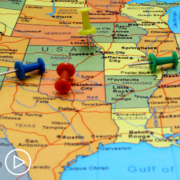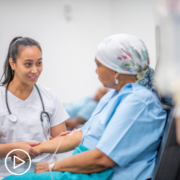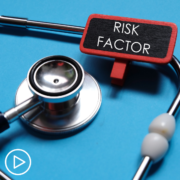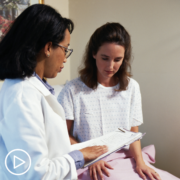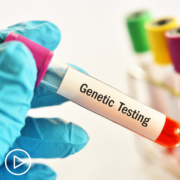Overcoming Geographical Barriers in Endometrial Cancer Care
Overcoming Geographical Barriers in Endometrial Cancer Care from Patient Empowerment Network on Vimeo.
How can endometrial cancer care barriers be overcome in regards to geographic location? Expert Dr. Emily Hinchcliff from Northwestern Medicine discusses geographic care barriers, solutions, and patient advice to be proactive in their care.
[ACT]IVATION TIP
“…understanding that post-menopausal bleeding is never normal and that you need to see a physician for that…regarding the fact that accessing care can be, as you mentioned, done in many, many different ways these days. And so understanding what your options are, whether that’s telehealth, whether that’s a consult visit and then receiving the majority of the subsequent care closer to home, you have a lot of options.”
Download Guide | Descargar Guía en Español
See More from [ACT]IVATED Endometrial Cancer
Related Resources:
Transcript:
Lisa:
If a woman goes in and is diagnosed at her local cancer center and has endometrial cancer, should she see some type of subspecialist, would it be of benefit to that patient maybe to even do a consult, a telemedicine consult at least upon diagnosis? Or how can a person who is more remote geographically access a subspecialist care or expertise?
Dr. Emily Hinchcliff:
Yeah, absolutely. So I think that telehealth has really changed medicine in general and provides some really great opportunities for access. There is a big kind of dichotomy in endometrial cancer where early stage disease is often caught because it has a symptom, vaginal bleeding is a symptom. And so early stage disease can often be treated with surgery alone.
And so that surgical management, again, can potentially be done by a GYN oncologist at a one single time point. The subsequent care, so I’ll just use myself as an example. I will often see women for sort of that initial visit, treatment decision, sometimes surgery, but then if they need additional adjuvant therapy, such as chemotherapy, they’ll go closer to home to receive some of those therapies. And then I will serve as a bit of a consultant to their providers closer to home to discuss what treatment options, what regimens and how to manage toxicities might be good in their case.
Lisa:
And do you have an activation tip for patients for that question?
Dr. Emily Hinchcliff:
Yeah, so I think that my activation tip here regarding barriers to endometrial cancer care is first and foremost addressing the knowledge gap, understanding that post-menopausal bleeding is never normal and that you need to see a physician for that, I think is the first key tip. The second tip, I guess, if I could give a second activation tip, is regarding the fact that accessing care can be, as you mentioned, done in many, many different ways these days. And so understanding what your options are, whether that’s telehealth, whether that’s a consult visit and then receiving the majority of the subsequent care closer to home, you have a lot of options. And we as a field in GYN oncology are really collaborative. And I think most of us would feel very positively towards creating a team to help you get the care you need.

